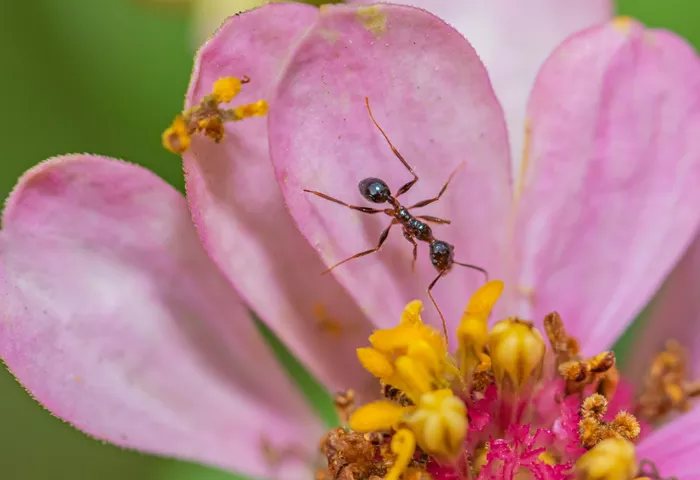Ants in flower beds can disrupt plant health, attract pests like aphids, and create unsightly mounds. While they aren’t always harmful, large colonies can damage roots or become a nuisance. This guide offers fresh, practical methods to get rid of ants without harming your blooms. From natural remedies to preventive strategies, you’ll learn how to reclaim your garden’s beauty and balance. Let’s dive into simple, effective solutions!
Why Ants Love Your Flower Bed
Ants are drawn to flower beds for shelter, food, and moisture. They often farm aphids—tiny insects that secrete sugary honeydew—which harms plants. While ants aerate soil, their tunneling can disturb roots, and their presence may indicate bigger pest issues. To get rid of ants, you first need to understand their behavior. Look for trails leading to nests, aphid clusters on leaves, or soil mounds near plants. Addressing these factors ensures long-term success.
7 Natural Ways to Get Rid Of Ants In Flower Bed Without Chemicals
1. Sprinkle Cinnamon or Coffee Grounds
Ants hate strong smells. Sprinkle ground cinnamon or used coffee grounds around affected areas. These disrupt scent trails and deter ants naturally. Reapply after rain.
2. Use White Vinegar Solutions
Mix equal parts white vinegar and water. Spray directly on ant trails or nests. The acidity masks their pheromones, making it harder for ants to regroup.
3. Deploy Diatomaceous Earth (DE)
Food-grade DE is a fine powder that dehydrates ants. Dust it around plant bases or nests. It’s safe for plants but lethal to pests.
4. Boiling Water Treatment
Pour boiling water into visible ant holes. This instantly kills colonies but may require repeat applications.
5. Citrus Peel Repellent
Soak citrus peels in water overnight, then strain and spray the liquid. The d-limonene in citrus disrupts ants’ nervous systems.
6. Borax and Sugar Bait
Mix 1 part borax with 3 parts sugar and water. Place near trails. Ants carry the bait to their nest, eliminating the colony within days.
7. Plant Ant-Repelling Herbs
Grow mint, lavender, or marigolds nearby. Their strong scents act as natural barriers.
Organic Solutions to Control Ants and Protect Plants
For gardeners avoiding harsh chemicals, these eco-friendly methods work wonders:
Soap Spray: Combine 1 tablespoon dish soap with 1 quart of water. Spraying this breaks down ants’ exoskeletons and removes aphids.
Essential Oil Blends: Peppermint, tea tree, or clove oil (10 drops per cup of water) repel ants. Apply weekly.
Cornmeal Bait: Spread cornmeal near nests. Ants eat it but can’t digest it, causing fatal blockages.
Beneficial Nematodes: These microscopic worms prey on ant larvae. Water them into soil for a biological fix.
Building Physical Barriers to Keep Ants Out
Block ants before they invade:
Sticky Traps: Wrap tree trunks or stems with sticky tape to trap foraging ants.
Gravel or Mulch Borders: Create a 3-inch-wide barrier of rough mulch or gravel around beds. Ants avoid crossing gritty textures.
Raised Beds with Hardware Cloth: Line raised beds with wire mesh to block underground access.
Water Moats: Place potted plants in shallow dishes filled with water. Ants can’t swim across.
When to Use Commercial Products to Get Rid Of Ants
For severe infestations, consider targeted treatments:
Ant Baits: Gel or granular baits contain slow-acting toxins. Worker ants share the bait, destroying the entire colony.
Insecticidal Soaps: These kill ants on contact but spare plants. Opt for brands labeled “organic.”
Boric Acid Granules: Scatter these near nests. They’re low-toxicity but effective over time.
Always follow label instructions and avoid spraying flowers directly.
Preventing Ants From Returning to Your Garden
Stop ants before they settle:
Remove Food Sources: Clean up fallen petals, fruits, and debris. Store compost away from beds.
Control Aphids: Spray plants with a hose to dislodge aphids, or introduce ladybugs as natural predators.
Fix Moisture Issues: Avoid overwatering. Repair leaky hoses or sprinklers.
Regular Inspections: Check under pots, rocks, and mulch weekly for early signs of ants.
Final Thoughts
Learning how to get rid of ants in flower beds takes patience and consistency. Start with gentle methods, escalate only if needed, and focus on prevention. By balancing natural remedies and smart gardening habits, you’ll protect your blooms and enjoy a thriving, ant-free oasis.


